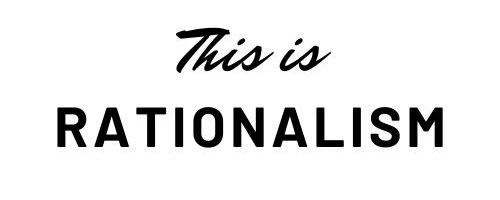
Rationalism, the belief that reason is the primary source of knowledge, has long been a foundational philosophy. Yet, it faces significant criticism. Many argue that it overlooks key aspects of human experience and reasoning.
In this article, we will explore the most common arguments against rationalism, shedding light on its limitations and the challenges it faces in modern thought.
Defining Rationalism
Rationalism is a philosophical stance that emphasizes the role of reason in the acquisition of knowledge. It holds that certain truths can be discovered through intellectual processes alone, independent of sensory experience. Rationalists believe that human beings have an innate capacity for knowledge, and through reasoning, they can uncover universal truths. This contrasts with empiricism, which stresses the importance of sensory experience in gaining knowledge. Rationalism has shaped many areas of philosophy, particularly in the works of figures like Descartes, Spinoza, and Leibniz.
Exploring the Most Common Arguments Against Rationalism
#1. Overemphasis on Reason
Critics argue that rationalism places excessive importance on reason, ignoring other ways humans acquire knowledge. Emotional intelligence, intuition, and cultural context often shape understanding in ways that reason alone cannot. This narrow focus can lead to an incomplete picture of reality, as it dismisses the nuanced and complex nature of human experience. By prioritizing logic over these other elements, rationalism risks oversimplifying the rich diversity of thought and perception.
#2. Disconnection from Empiricism
Rationalism often assumes that knowledge can be derived purely through reason, independent of sensory experience. Opponents argue this creates a gap between theory and practical observation. For example, scientific advancements depend on empirical evidence, not solely deductive reasoning. This disconnect raises questions about the reliability of conclusions reached without real-world verification. Critics contend that rationalism’s disregard for empirical data undermines its applicability to many fields of inquiry.
#3. Limitations of Deductive Reasoning
Deductive reasoning, central to rationalism, requires starting premises that are assumed to be true. However, if these premises are flawed, the conclusions will be incorrect, no matter how logically sound the process. Critics highlight this reliance on assumed truths as a significant weakness. Deduction cannot generate new knowledge; it only rearranges existing ideas. This limitation hinders its ability to address dynamic, evolving, and unpredictable aspects of reality.
#4. Failure to Account for Diversity
Rationalism often assumes universal principles that apply to all humans, ignoring cultural, social, and individual differences. Critics argue that this universalist approach oversimplifies the complexities of human existence. What seems rational in one culture may not resonate with another, as values, experiences, and perspectives differ widely. By failing to incorporate diversity, rationalism risks alienating those whose worldviews fall outside its narrow framework.
#5. The Problem of Innate Ideas
Rationalists claim that humans possess innate ideas—knowledge that exists independently of experience. Opponents question the validity of this concept, arguing there is no conclusive evidence for such ideas. Critics assert that all knowledge arises from experience and interaction with the environment. They argue that the notion of innate ideas is speculative and lacks the empirical basis needed to support its claims.
#6. Subjectivity in Rational Thought
While rationalism seeks objectivity, critics point out that reasoning is often influenced by subjective factors, such as biases, assumptions, and cultural conditioning. Rational thought is not immune to human flaws, and conclusions reached through reason can reflect personal or societal prejudices. This subjectivity undermines rationalism’s claim to provide universally valid truths, as what appears rational to one person may not to another.
#7. Inapplicability to Practical Life
Rationalism’s theoretical nature often makes it impractical in real-life situations. Critics argue that many decisions require quick judgment, emotional intelligence, or contextual understanding—areas where pure reason falls short. Everyday problems, from interpersonal relationships to complex societal issues, often demand a blend of rational and non-rational approaches. Rationalism’s rigidity can make it ill-suited for navigating the complexities of practical life.
#8. Neglect of Ethical and Emotional Dimensions
Rationalism tends to focus on logical consistency, often overlooking ethical and emotional considerations. Critics argue that this creates an incomplete framework for understanding human behavior and decision-making. Morality and emotions play crucial roles in shaping values and actions, yet rationalism often relegates these to secondary importance. This neglect limits its ability to address the full spectrum of human concerns.
#9. Historically Flawed Outcomes
Historical applications of rationalist principles have sometimes led to flawed or harmful outcomes. Critics point to events where rigid adherence to reason ignored the complexities of human behavior and societal dynamics. For example, certain political ideologies rooted in rationalism failed to account for ethical or emotional dimensions, resulting in unintended consequences. These historical failures demonstrate the limitations of relying solely on reason.
#10. Limits of Human Reason
Rationalism assumes that human reason is capable of comprehending all truths, but critics argue this is an overestimation. Cognitive biases, mental limitations, and the vast complexity of the universe challenge this assumption. Humans are not infallible, and reason is often constrained by factors beyond their control. Acknowledging these limits undermines the rationalist claim that reason alone can lead to complete understanding.
#11. Challenges from Modern Science
Advances in modern science challenge many foundational assumptions of rationalism. Quantum mechanics, for instance, defies classical notions of logic and predictability. Critics argue that rationalism struggles to adapt to these developments, as its reliance on certainty and clarity conflicts with the probabilistic and often counterintuitive nature of modern scientific discoveries. This raises questions about the relevance of rationalism in an ever-evolving scientific landscape.
Conclusion
Rationalism, while influential, faces significant criticism for its limitations and overreliance on reason. Its disconnection from empiricism, neglect of diversity, and failure to address emotional and ethical dimensions highlight its shortcomings.
Furthermore, modern science and human cognitive limits challenge its foundational assumptions. By understanding these arguments against rationalism, we can appreciate the need for a more balanced approach that integrates reason with other ways of knowing, ultimately enriching our pursuit of truth.
